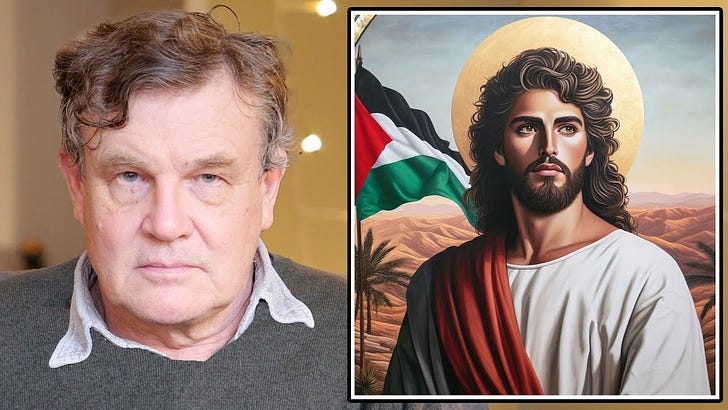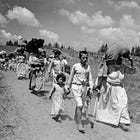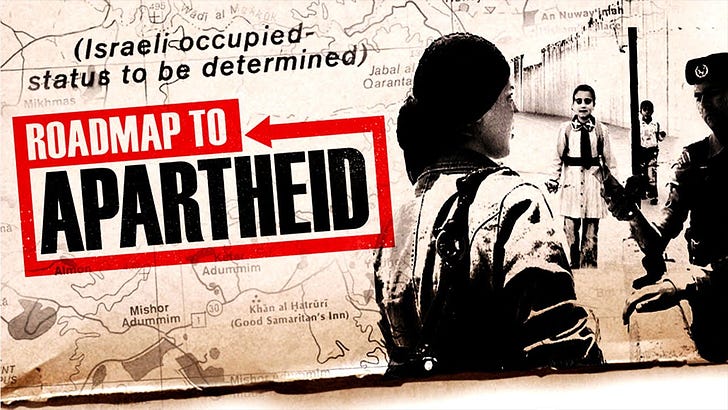"Jesus Would Be Killed in Gaza” – Peter Oborne’s Alternative Christmas Message
“The Christmas story actually gives us hope in the fact that Jesus was born among the occupied."
Please watch, listen to British award winning journalist Peter Oborne’s poignant, truly resonant Christmas message.
If you have received this post by email, please click on the title to read it in full on Substack.
This is the transcript for the video. Please note that I have added a few links for information purposes.
Jesus was always on the side of the oppressed. He was always against the oppressor.
If he had been born in Britain today he'd have been locked-up.
He was a subversive figure in Palestine. He probably would have been killed by now.
He would have been on the side today of the people in Gaza who were being bombed.
He would have been on the side of the people trying to grow olives whose olive trees are being burnt and I'm sure that Jesus would have had very profound discussions with Israeli soldiers at checkpoints.
I can imagine him having very difficult conversations with the leaders of Hamas.
I can imagine his dismay at the corruption of the Palestinian Authority.
Remember the sort of conversations he had with the Centurion. I think he'd have had exactly the same kind of conversation with an Israeli Commander.
But eventually, I dare say, somebody would have killed him probably in a really gruesome way.
So figuratively put down your mince pies and your Christmas celebrations just for a moment and think about the Nativity of Jesus, the birthplace of Christianity and consider for a moment what is happening as we speak in what Christians still think of as the Holy Land.
The journey which Mary and Joseph made according to the Gospels from Nazareth to Bethlehem – It's a very difficult journey to make now. You have to cross a wall, the apartheid wall as the Palestinians call it.
There are actually three refugee camps in Bethlehem. The wall runs right through it and it's very tough for the Palestinians.
I've been to the West Bank many times and it's always haunting to be there.
The Israelis call the West Bank, Judea and Samaria. These are of course biblical terms.
The Israelis see anything which is in the Bible as their property.
“Everything is the Jew’s not a single piece for people. Only for us.”
Wherever there's a shrine or a tomb you'll get the settlers coming in attacking and saying it's their property. They are dangerous places as a result and always most dangerous of all for Palestinians.
It's worth remembering that a lot of the landscape in Palestine is the same as it was 2,000 years ago. Olive trees, farms and you can visit so many of the exact same places which Jesus went to in Palestine. For example, when I was in Nablus I visited Jacob's Well. Places which are scarred now by occupation.
For Palestinians there's a theology of occupation developed by the priests there.
“The Christmas story actually gives us hope in the fact that Jesus was born among the occupied. This is what happened 2,000 years ago and so going back to this manger setting, it tells us that baby Jesus is in solidarity with those who are suffering, with those who are oppressed.” – Munther Ishaq, Lutheran Pastor
There's Bethlehem Bible College where they discuss what they call the “church at the checkpoint” or “the other side of the wall.” In other words what it's like to be a Christian, a Palestinian under occupation.
“Christians in Jerusalem's Old City say they are often harassed and even physically attacked. Ultra Orthodox Jews spit toward Christians carrying a cross in occupied East Jerusalem this week. Other videos also widely seen on social media show Jews spitting toward nuns outside a church.“
They draw enormous strength from Desmond Tutu. There's something called the Caros Project which is based on Christianity under apartheid and they draw the lessons, what that is, in occupied West Bank.
It's often forgotten that alongside Palestinian Muslims there are many Palestinian Christians.
“There are no churches in Gaza so I'm not quite sure where the report is talking about.”
”There’s a Catholic church in there isn't there that is…“Yeah, and fortunately there were no Christians because they were driven out.”
“Respectfully there are Christians because I spoke to an MP yesterday who has family members in the church who are Christians.”
Palestinian Christians for example, provided a great deal of the early leadership for the liberation movement in Palestine.
There are Christian communities in Gaza.
The third oldest church in the world St. Porphyrius was bombed during the first wave of attacks in Jenin, one of the most violent places in the West Bank, constantly under attack from Israel. But there, just a mile or so away from the refugee camp, there is this ancient church.
It's quite easy to forget that there is a very substantial Christian community.
My wife and I had the privilege of delivering medical equipment to Ahli Hospital in Gaza. That of course was bombed but it's played an amazing role in saving lives throughout the last two months.
And I've seen the Catholic church called The Church of the Holy Family. It's not just the religious things they do but it's social work they do, looking after the disabled, the people who are troubled in various ways. It was like seeing Christ at work – completely sacrificial. The emptying of self. Caring for people who are so much in need of help and security.
There's this idea there there's a great deal of hostility between Christians and Muslims. I didn't detect that.
There's a very old Christian School in Nablus and it teaches 40 children. They're all Muslim. Christians are part of the community and in Bethlehem I saw them being part of the resistance as well.
And then there are the other strands of Christianity, principally the Evangelical strand on the side of the Israeli State. And on the side of the occupation because they have an etiological view of the world which generally speaking, needs or celebrates the state of Israel based on an interpretation of the Book of Revelations. You need the Jews of the world to congregate in Israel for the second coming. This of course is deeply anti-semitic.
Because the Jews have the choice at the end of converting to Christianity or facing Eternal damnation which is of course profoundly anti-semitic.
[Evangelical Christian video clip: “Israel should make the Gaza Strip a parking lot by this time next week, Destroy the whole thing and get a great big missile and blow that wicked Dome of the Rock plum off of the spot where it's standing right now so we can get that third temple rebuilt and usher in the coming of Jesus!”
One of the paradoxes of what's going on in the Middle East is that Jerusalem is sacred to the three great Abrahamic religions – Islam, Christianity and Judaism –and they all look at Jerusalem as an enormously holy place and they all worship of course the same God.
Whether you're Christian, whether you're Jewish, whether you're Muslim, Abraham is your Patriarch. He's the founder of your religion, although Judaism and Islam are probably a bit theologically closer to each other than they are to Christianity.
The conflict is not actually about religion at all. It's about land and the occupation of it.
If you talk to Christian scholars, to Jewish scholars, to Islamic scholars they understand this very well.
For Palestinians, they are not fighting as Christians or Muslims against Jews as is frequently suggested. They are fighting against those who they see – and international law agrees with them – have imposed an illegal occupation.
Speaking as a Christian, Christmas has got a bit commercial, to put it mildly. It's become a festival of consumerism but this might be a good year to focus a little bit more on the meaning of Christmas, bearing in mind the message of Christ who arrived in the world 2,000 years ago and was very much shaped by the kind of tragedy and struggle which is still going on 2,000 years later in the place where he was born.
Jesus had many profound messages but one of his messages is to love thy neighbour. Forgive the trespasses of other people. It's about mercy it's about forgiveness, it's certainly not about taking revenge, and I don't think you can celebrate Christmas this year in quite the same way as you can in normal years.
In Bethlehem, birthplace of Christianity, Christmas has been cancelled.
“This year, Christmas celebrations are canceled in Bethlehem.
“It's impossible to celebrate while our people in Gaza are going through a genocide, when children are being massacred in such a brutal manner.
“All the heads of churches in Jerusalem decided that Christmas celebrations will be mainly prayers with no festive celebrations.
“While the world is celebrating our children are under the rubble.
“While the world is celebrating our families are displaced and their homes are destroyed.
“So this is Christmas to us in Palestine.” – Munther Ishaq, Lutheran Pastor
While all this is going on we should all pause and reflect and pray for the end of this nightmare.
My hope for Christmas and this surely is the message of Christmas, is for peace.
This Christmas if you've got some spare cash – you haven't probably got any left now – think about donating to Medical Aid for Palestinians. It's a wonderful charity which brings hope and relief to people who are suffering awfully as we speak.
Peter Oborne is a former political commentator of the Spectator, the Daily Telegraph and Daily Mail. He now writes about politics for Open Democracy and Middle East Eye. He is the author of The Triumph of the Political Class, and The Rise of Political Lying as well as a biography of the cricket Basil D’Oliveira.
Related posts:











The Dead Sea Scrolls revealed The Righteous Teacher (Joseph used this character to create Jesus) to be a warrior and philosopher. He hated the Romans so why would Jesus say Turn The Other Cheek and Give Unto Caesar?
You deserve more reader comments, A.D.
On related themes . . .
The long and rich history of the contemporary genocides of the cultured, cultivated Europeans, The Americans and the Brits., to nominate yet a few.
And first, of Washington's lost Ukrainian Proxy War to weaken Russia and pillage its resources, perhaps the greatest and most feckless imperial play, something of a progress update.
https://les7eb.substack.com/p/genocide-and-economics
Free to subscribe . . . The Dead Do Not Die.
_____________